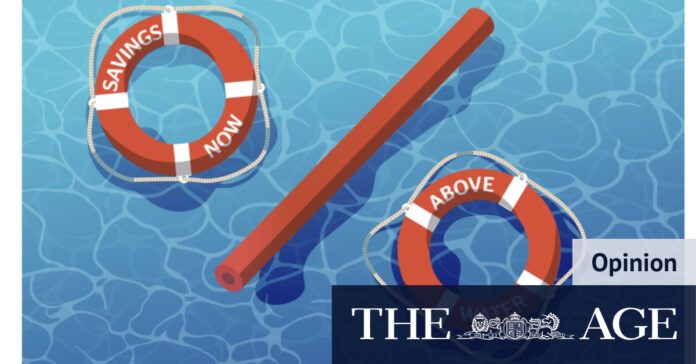[ad_1]
This is partly because the value of Australian mortgages, at $2.1 trillion, is far greater than the $1.4 trillion in household bank deposits. That means the pain inflicted on mortgaged households from a rate rise is greater than the benefit savers get when their savings rates increase.
All the same, what happens to deposits is another channel through which monetary policy affects households and the economy more generally. Lately, some of these effects are becoming more pronounced.
Loading
Some banks outside the big four, such as Macquarie Group or ING, are offering maximum savings rates of about 5.5 per cent, which is higher than the rate of inflation. Macquarie’s rate only lasts four months, ING’s has various eligibility criteria, and the big four banks are offering less because they don’t have to work as hard to attract money.
But even so, the fact some savings accounts are now beating inflation is a turning point. The average “bonus” rates advertised by banks have been lower than the monthly inflation rate since late 2019, Reserve Bank figures show, but now that gap is closing.
As inflation continues to fall, as it’s widely expected to, the real interest rates on savings accounts should improve further.
Now, this doesn’t mean banks have been particularly generous to savers. In August, the Reserve Bank said the average deposit rate had risen by only 2.4 percentage points since it started lifting rates in May last year – well below a 4.1 percentage point rise in official rates in that period.
As always with banking, deposits are priced in a way that penalises inertia. Getting the most competitive savings rates requires a willingness to shop around, and a certain amount of jumping through hoops. You may need to make a regular contribution to your account, make a certain number of transactions each month, or make sure the balance is growing each month.
The Australian Competition and Consumer Commission has been looking into all of these tactics used by banks as part of an inquiry into the deposit market – its final report is due with Treasurer Jim Chalmers by the start of December. It seems likely the watchdog will emphasise the importance of savers hunting around to get a better deal.
But even if the banks have dragged their feet in passing on rate rises to savers, lately bankers have been forced to compete a bit more fiercely for household deposits because of a change in household behaviour: more people have been moving money into high-interest accounts.
When rates were moving from near zero to say 0.5 per cent, there wasn’t much to be gained by putting your money in a higher interest savings account. But for a 5 per cent return, it may well be worth jumping through the various hoops required to get the banks’ “bonus” rates.
Loading
Major banks have seen billions of dollars shift from transaction accounts paying zero interest into higher-interest accounts, and they’ve had little choice but to respond by paying more for this money.
For savers such as retirees, the rise in savings interest rates should ultimately mean there is less pressure to go on a “hunt for yield” and chase higher returns through riskier investments such as shares.
This is good news for savers, and a sign that financial settings are gradually heading back to something more normal. Near zero interest rates had all sorts of damaging side effects: they fuelled speculative bets on high-risk assets such as cryptocurrencies, they helped drive a surge in housing lending, and they meant savers were effectively going backwards.
The fact savers can now beat inflation (slightly) is a sign that the weird world of ultra-cheap money is a long way in the past, and we are unlikely to return there soon.
Ross Gittins is on leave.
The Business Briefing newsletter delivers major stories, exclusive coverage and expert opinion. Sign up to get it every weekday morning.
[ad_2]
Source link



